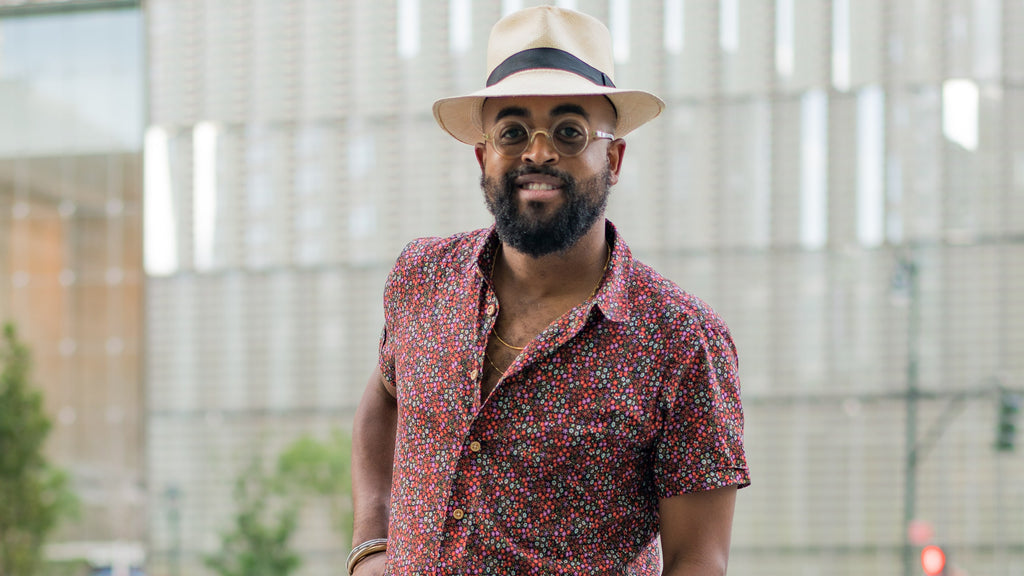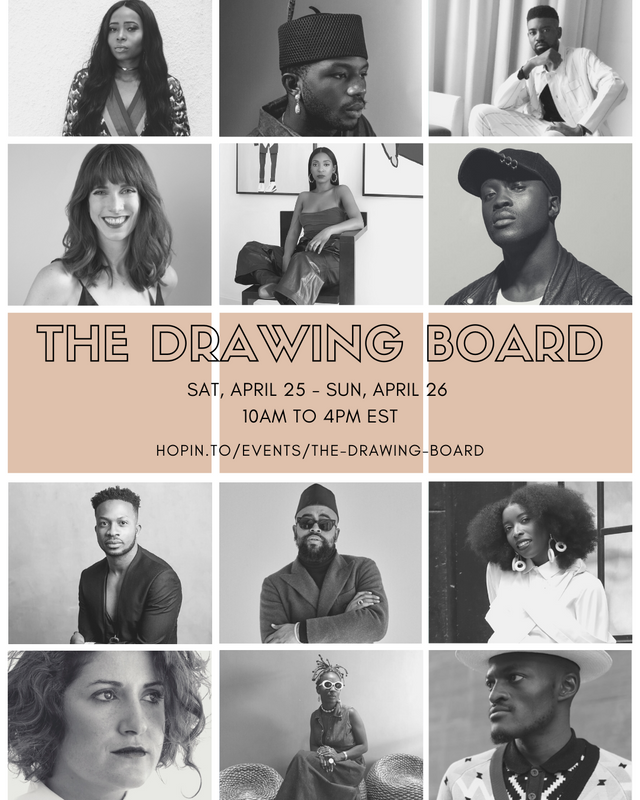Introducing 'The Drawing Board': A Virtual Fashion Summit Hosted by The Folklore
In response to COVID-19's devastating impact, online concept store and wholesale showroom, The Folklore, is gathering some of fashion’s top voices to aid in international relief efforts. The Folklore has partnered with African-based brands Orange Culture, MaXhosa, Tokyo James, Pichulik, and I.AM.ISIGO to host The Drawing Board, a two-day virtual fashion summit designed to provide access to top industry experts, create a platform for networking, and supply support to African-based brands affected by COVID-19.
Attendees will have the opportunity to enjoy 35-minute masterclass sessions led by GQ Fashion Director Mobolaji Dawodu, sustainable fashion journalist Alden Wicker, Allure / Conde Nast Fashion Director & Creative Lead Rajni Jacques, stylist and creative director Daniel Obasi, creative executive & social activist Ugo Mozie, designer Laduma Ngxokolo, designer Katherine-Mary Pichulik, designer Adebayo Oke-Lawal, designer Tokyo James, and designer Bubu Ogisi.
Guests can also directly ask speakers questions, have 1 on 1 networking meetings with other attendees, explore exclusive expo booths, and jam to live music sets provided by DJ duo Pilot Jones (Kailyn Hype + Nneoma). Some of the topics that will be covered during the summit include in-house production strategy, navigating press marketing, fashion journalism today, building a sustainable fashion brand, and developing a career as an international stylist.
The Drawing Board will be moderated by The Folklore Founder and CEO Amira Rasool, Vogue Beauty Editorial Assistant Akili King, and Essence Assistant Fashion Features Editor Nandi Howard.
Register for the event on Hopin here and find out more about the speakers below.

Alden Wicker, Sustainable Fashion Journalist
Alden Wicker is a New York City based freelance journalist and sustainable fashion expert, who's written investigative pieces and deep dives on innovation, materials and consumer trends for The Cut, Vox, Vogue Business, Newsweek, Refinery29, Quartz, Fast Company, Inc. Magazine, Glamour, Popular Science and more. She's also been interviewed for the BBC, NPR, Reuters, Fortune, CBC, The Cut, Al Jazeera, Harper's Bazaar, and Teen Vogue. In addition, she leads an international blog on sustainable and ethical fashion that she founded in 2013 called Ecocult.

Mobolaji Dawodu, GQ Fashion Director
38 year-old fashion director of GQ, Mobolaji Dawodu is known for his singular style in his editorial work filled with patterns and color that highlight the individual being photographed. Nigerian born, he's lived in New York City for 20 years, having spent 11 of those years working at The Fader as a style editor-at-large. He first got his start after enrolling at LIM for fashion marketing and interning at Dolce & Gabbana's showroom, which opened his eyes to what styling actually was. He has also worked in film, costume designing for directors like Mira Nair and most recently, Hiro Murai, in the musical film Guava Island starring Donald Glover and Rihanna.

Rajni Jacques, Allure and Teen Vogue Fashion Director
After attaining her masters in Journalism at Columbia University, Rajni dived straight into fashion by interning at the now defunct Honey magazine and interned at The Fader and InStyle Magazine. She then had a two years stint at Christian Louboutin as a Public Relations Director, but returned to magazines as an editor at Vibe, Nylon and Glamour. She took on creative consulting work with Nordstrom, Nike and Coach before becoming a director at both Allure and Teen Vogue. In addition, she's collaborated with Anna Laub, founder of Prism London, on a swimwear lineup, and was featured in Farfetch x Balenciaga's eco-focused capsule collection campaign featuring her husband and kids.

Daniel Obasi, Stylist and Creative Director
Daniel Obasi is a Nigerian-born and based art director, stylist and photographer. Wanting to advance the scope of African narratives visually, he produced his first major film and editorial work Illegal Project on gender non-conforming expressions in African settings in 2017. His whimsical, soft, ethereal and Afrocentric aesthetics led him to successfully create new films on taboo subjects in African society. His latest film, An Alien in Town, was shortlisted in major Fashion Film Festivals in Milan and Bucharest and shown by the Smithsonian Center at The National Museum of African American History and Culture. He's also contracted major work as a stylist and director for music videos such as Major Lazer and Burna Boy's All My Life and Falana's Ride or Die. In addition, he's been commissioned for Orange Culture, I.AM.ISIGO, Vlisco, Miu Miu, iD Magazine, Nataal Media, Garage Magazine, Afro-punk, Hunger Magazine and Marie Claire SA amongst others.

Katherine-Mary Pichulik, Jewlery Designer of PICHULIK
Cape-based jewelry designer Katherine-May founded her line PICHULIK in 2012. With a background in pastry and fine art, she emerged as a jewelry maker by creating a collaborative brand that offers a cross-cultural narrative integrating inspiration from all corners of Africa. The pieces transmit journeys throughout the continent, fusing with empowering stories on women embracing self-worth and self-acceptance. PICHULIK transforms a simple element such as rope by combining woven materials with Ghanaian agate stones, fossilised forms from Niger, West African brass parts and Ethiopian recycled glass.

Adebayo Oke-Lawal, Orange Culture Designer
Adebayo Oke-Lawal’ s goal for creating Orange Culture in 2011 was to provide a platform to voice his frustrations with the hyper-masculine prescribed identities that surrounded him in Lagos. The lines’s androgynous style and willingness to push boundaries led Adebayo to the LVMH Prize finals in 2014 and an opportunity to produce a London Fashion Week Men’s collection. Being honest about his feelings allows Adebayo to create collections imbued in authenticity, and this has an impact towards stirring social issues and conversations further. Wanting to make Nigerian men understand how they feel and think about the way they mentally and emotionally process clothes is his ultimate aim. Because of his own insecurities growing up of not feeling ‘man enough’, he finds it important to address the men’s fears surrounding vulnerability and willingness to emote.

Tokyo James, Designer of Tokyo James
Tokyo James is a British-Nigerian Designer and the Creative Director of his eponymous brand, Tokyo James. Before launching his brand, James began his creative career as a fashion stylist, working for various international publications, as well as directing digital campaigns for brands such as Brioni, Issey Miyake and Puma Black Label. He then launched a digital monthly publication, Rough UK, a style, arts and culture digital platform. His foray into editorial led him back to Lagos, where he joined quarterly fashion and lifestyle magazine, MADE, as editor-in-chief. In 2015, the Tokyo James fashion brand was born, crafted for “modern men who want simplicity with an edge.” As the brand has grown, the designer continues to put an emphasis on traditional techniques and clean lines, as well as silhouettes that maintain consistency and lend to wearability.
Laduma Ngxokolo, MaXhosa Designer
Born in Port Elizabeth in 1986, Laduma Ngxokolo had his first hands-on experience in textile design in 2003 during a high school course, leading to a bursary to study design at university. He won the South African Society of Dyers and Colorists Design Competition for his traditional Xhosa inspired knitwear, which led to a life changing trip to London. He has received numerous achievements and captured the hearts of many fashion lovers and media ever since from South Africa, London, Paris, Amsterdam, Oslo, Berlin and New York. In 2014, Laduma was awarded the 2014 WeTransfer Scholarship to study a masters in Material Futures at the Central St. Martins and in 2015 he won the Vogue Italia Scouting for Africa Prize, allowing him to showcase his collections at the Palazzo Morando Show in Milan, Italy.
 Bubu Ogisi, I.AM.ISIGO Designer
Bubu Ogisi, I.AM.ISIGO Designer
Bubu Ogisi founded I.AM.ISIGO in 2009 in a bid to create a striking awareness of how African culture can be fused with an audacious yet minimal design aesthetic. Based primarily in Lagos, Bubu has also included home decor as part of the brand's offering. Whilst primarily drawn to the arts and architecture, designing clothes came naturally to her because it is the most direct way to physically represent who she is. The name of the label stems from her surname, which means a lot to her, with the added prefix I.AM. Ultimately, she is designing for the women who are simple at heart but yearn for more.




